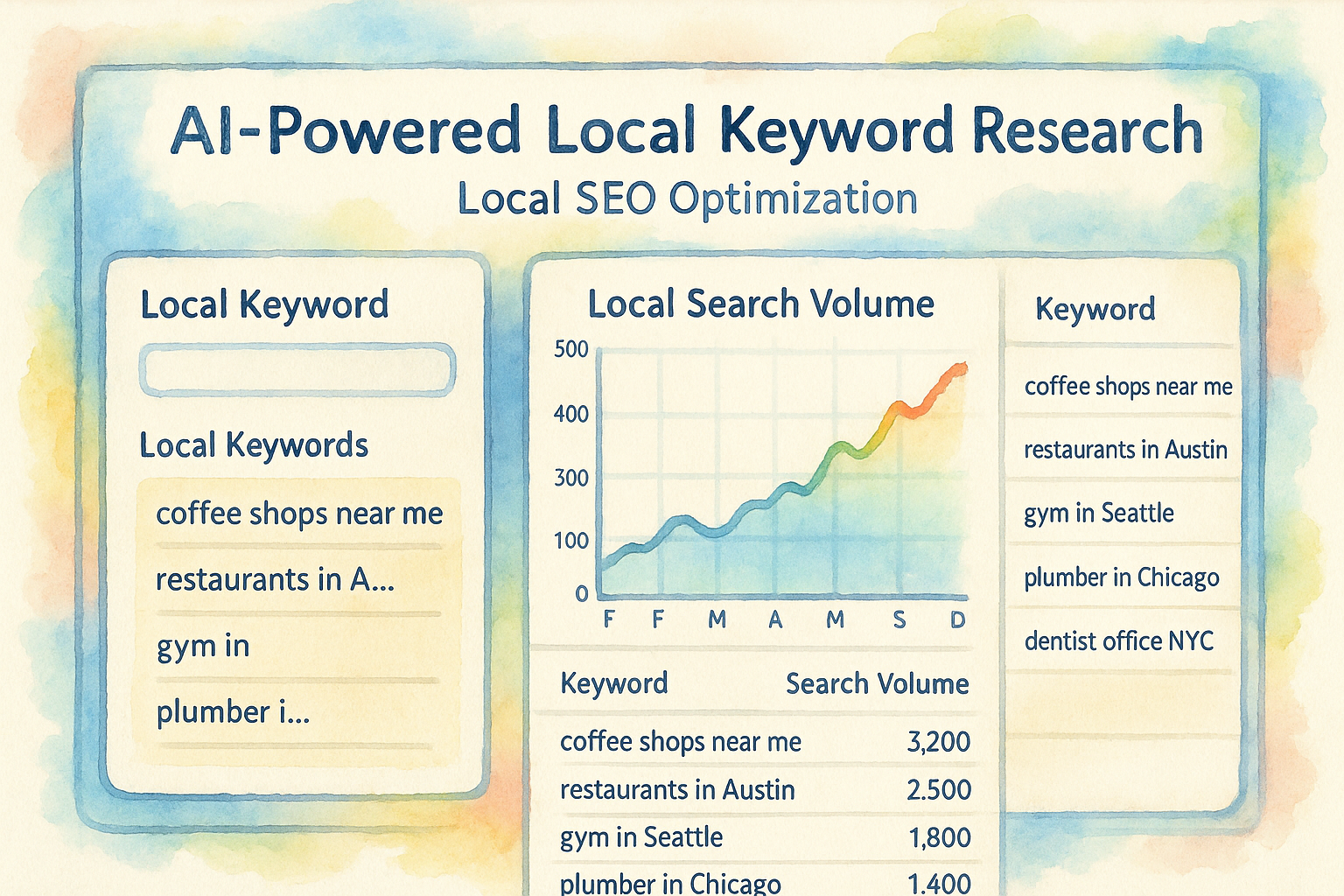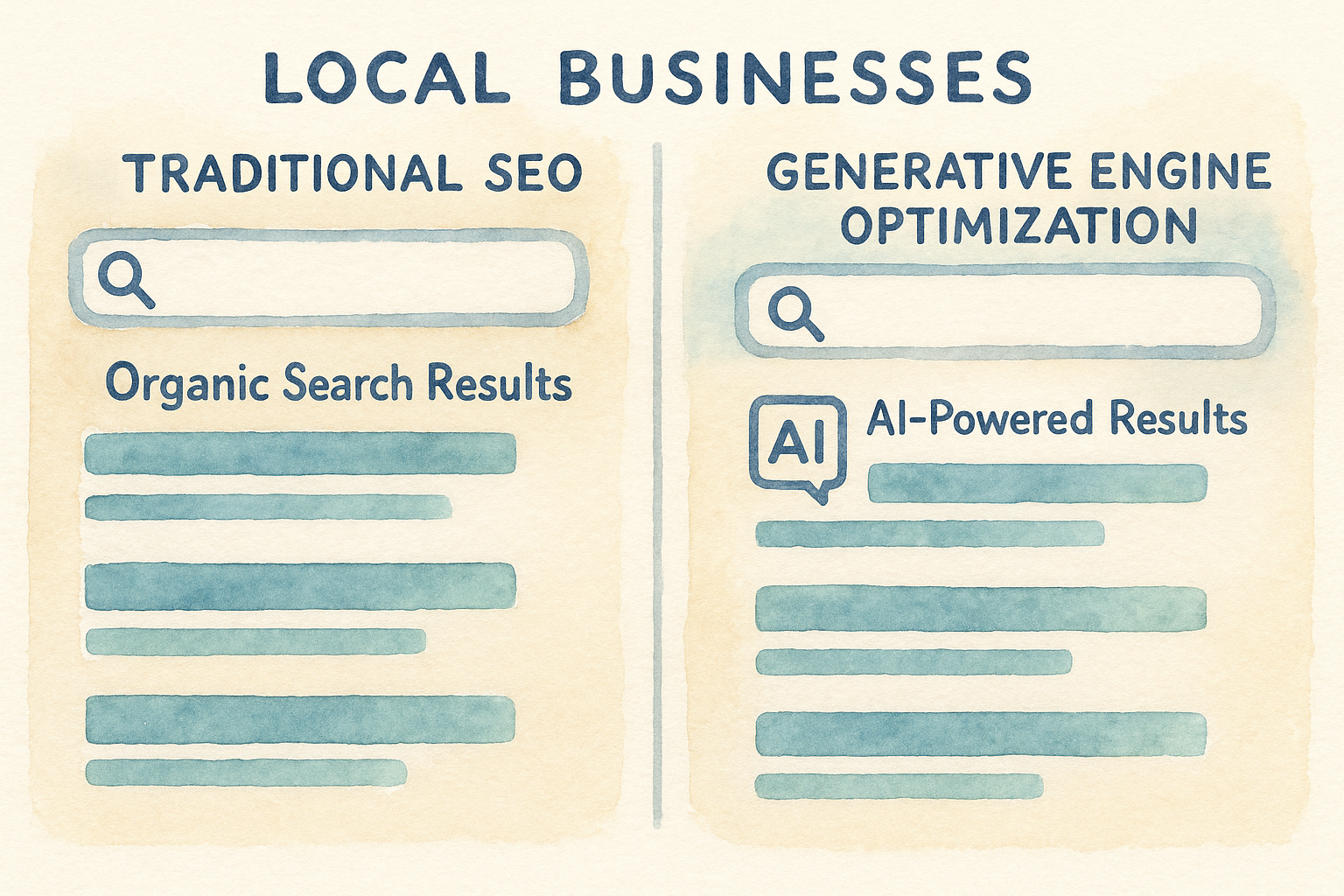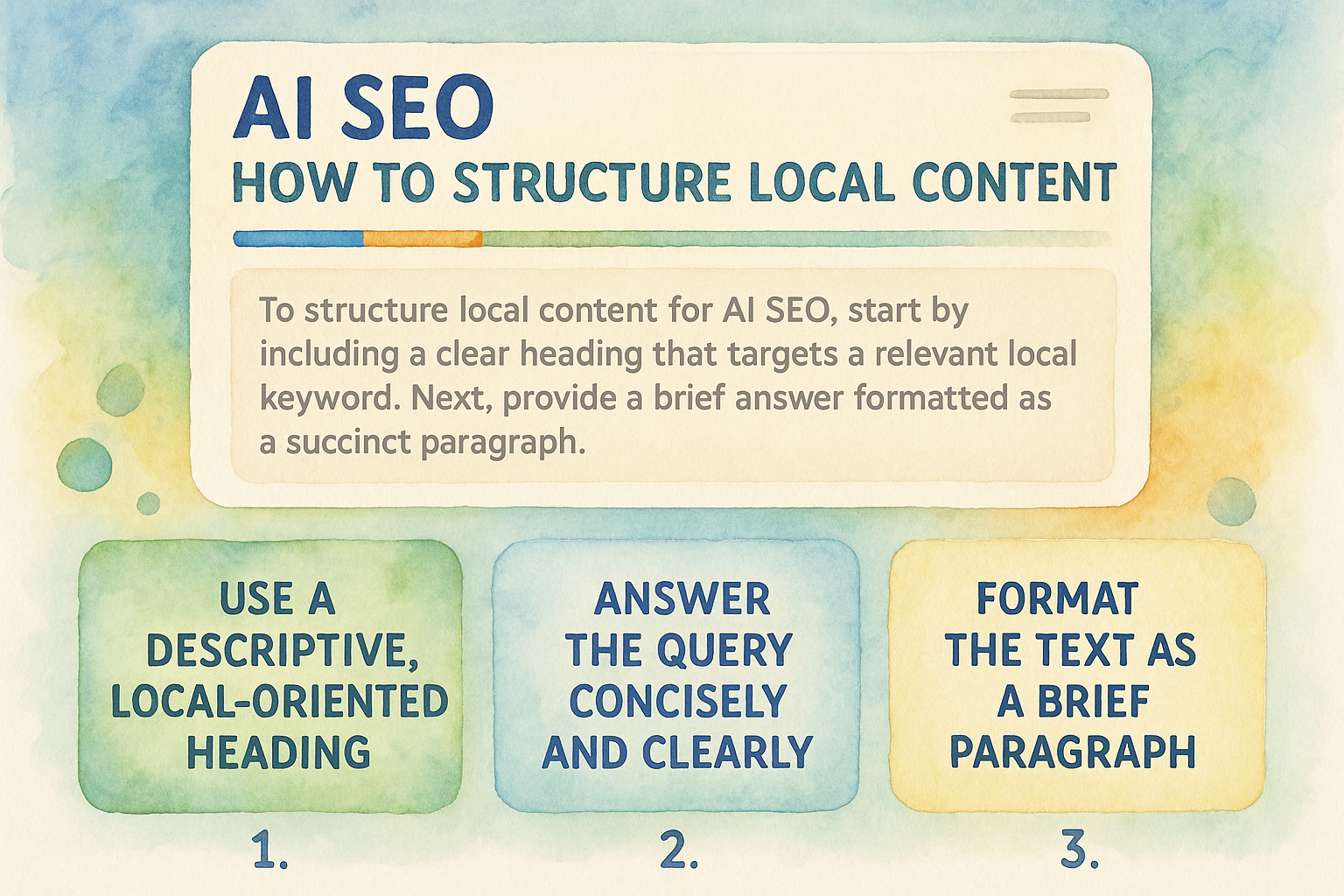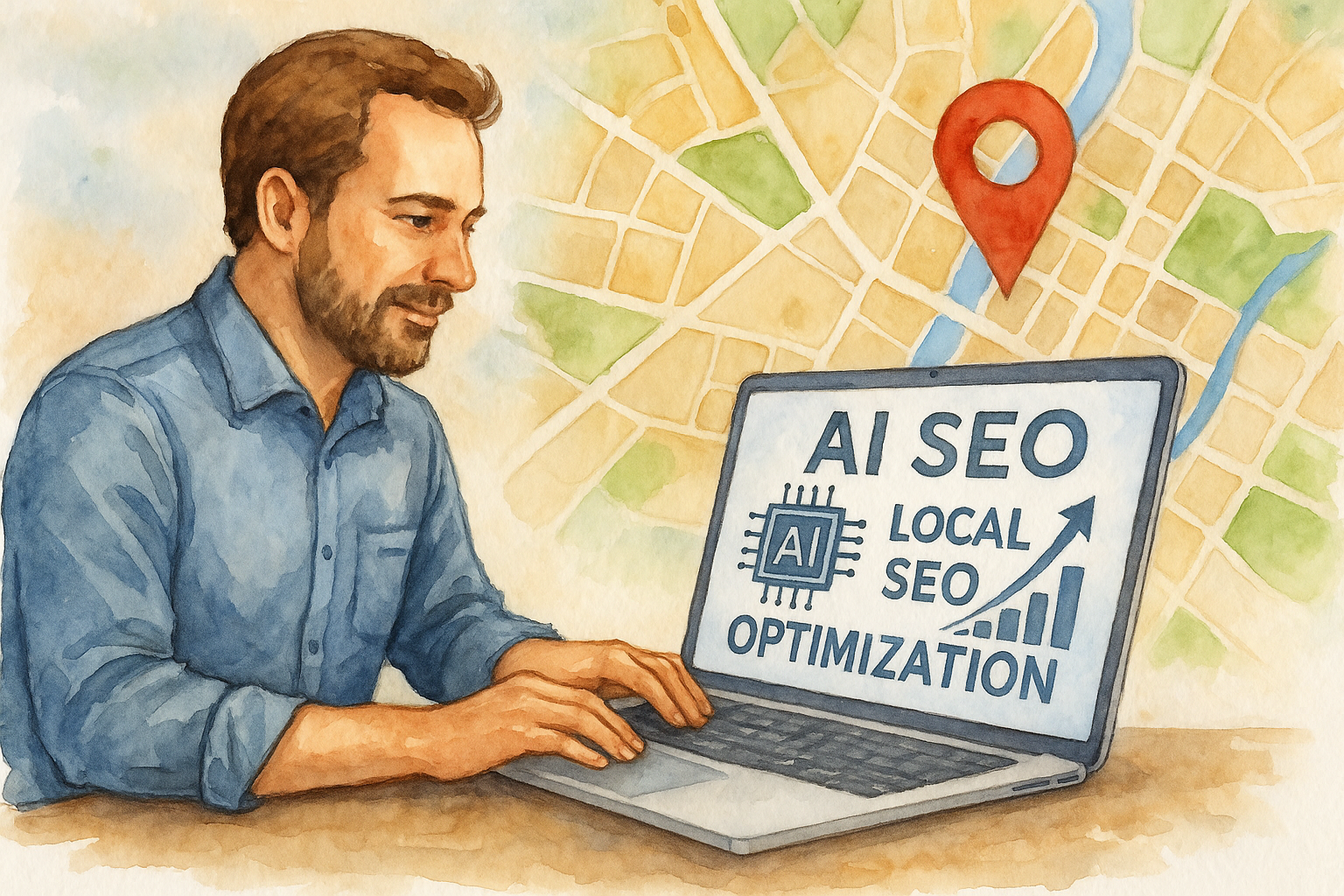AI powered local SEO optimization is revolutionizing how local businesses attract customers online.
But what does it really mean to leverage AI in local SEO?
This guide will provide a comprehensive cheatsheet for mastering AI driven local SEO strategies.
Some are cutting-edge keyword research methods that reveal what locals are truly asking online.
Some are smart automation tools that save hours of tedious SEO tasks while boosting rankings.
Some are content strategies designed to appeal directly to AI-powered search assistants like Google’s AI Overviews and ChatGPT.
Some are insightful ways to avoid common local SEO mistakes that stunt your growth.
Some are best practices for blending AI with traditional SEO fundamentals to future-proof your local presence.
Let's dive right in.
What is AI Powered Local SEO Optimization?
AI powered local SEO optimization means using artificial intelligence technologies to improve your website’s visibility in local search results. It combines traditional SEO tactics with AI-enhanced keyword research, content creation, and ranking strategies tuned specifically for local intent queries. This includes everything from finding the natural language questions your local audience asks AI assistants, optimizing your Google Business Profile with AI insights, to automating the tedious parts of local SEO so you can focus on growth.
Longtail conversational keywords, ranking for AI-driven search results, and integrating local business data consistently across digital platforms are all part of this approach. Businesses that tap into these AI capabilities gain a significant competitive edge in crowded local markets. Source
Why Is AI Powered Local SEO So Important in 2025?
Almost half of all Google searches have local intent — people want timely, location-specific results. But AI is drastically changing how local customers search. Instead of short keyword phrases like "pizza near me", users ask full, detailed questions like "What's the best vegan pizza restaurant open late downtown?" Local SEO must evolve to target these complex queries.
AI-powered search engines use generative AI to summarize and answer queries directly on the search results page, which reduces clicks to websites. This creates a need for businesses to optimize their content to be the trusted sources these AI tools cite. Incorporating AI optimization tactics ensures your business isn’t lost in AI-generated answers but featured prominently.
Additionally, AI tools save you massive amounts of time in keyword research, content creation, on-page SEO, and competitor analysis — letting you outpace competitors who stick to manual, outdated techniques. The result? Increased visibility, more foot traffic, and higher conversions. Source Source
TL;DR
AI powered local SEO optimization transforms local search by handling detailed, conversational queries and automating tedious SEO processes. Businesses leveraging AI see superior rankings and higher local customer engagement.
How to Start AI Powered Local Keyword Research?
The foundation of any successful AI powered local SEO strategy is thorough, AI-enhanced local keyword research. Start by making a list of your core products and services, especially those you’ve listed on your Google Business Profile. Then, brainstorm geo-modifiers – city names, neighborhoods, colloquial terms – that local customers use when searching.
For example, if you run a dental practice in the Warehouse District of Minneapolis, seed keywords could include "emergency dental service warehouse district," or "downtown Minneapolis teeth whitening." Using AI-powered keyword research tools can generate hundreds of related real search terms and natural language questions, e.g., "Who offers sedation dentistry near me downtown?" These tools automatically analyze search volume, difficulty, and intent for each phrase so you prioritize effectively.
Voice search adds another layer; people speak queries differently than they type. AI tools identify these natural speech patterns to capture voice search opportunities.
Instead of manual repetitive search term entry, platforms like Local Falcon’s Local Keyword Tool can crunch data by analyzing your location and services, producing extensive relevant keyword lists quickly. This saves hours and uncovers hidden high-intent terms you might otherwise miss. Source

What Are Common Local SEO Mistakes to Avoid?
Many businesses overlook critical facets of local SEO that AI tools now help detect and correct. Nearly 30% of multi-location businesses do not even display location details on their websites or local listings, severely limiting their rankings for local searches.
Another major pitfall is inconsistent or incomplete location data across platforms. Google rewards precise, matching business details — name, address, phone number, and categories — but punishes mismatched or missing info.
Reviews are also incredibly powerful. Businesses that ignore review collection and responses suffer negative reputations and lower search rankings. Timely, genuine engagement with customer feedback signals trust and local relevance to search engines.
Lastly, ineffective category selection or failure to leverage newer Google attributes (like "women-led" or "LGBTQ+ friendly") can hinder your appearance for relevant users.
AI-powered tools now enable automated detection and correction of these errors, keeping your listings updated and competitive. Visual content such as photos and videos, frequently neglected by businesses, dramatically improve engagement and rankings when optimized correctly.
Ensuring your local landing pages and service area pages are well-structured and rich with localized keywords is essential to ranking well beyond close proximity. AI insights can guide you where supporting and neighborhood-specific pages are needed to expand your local footprint.
More on local SEO mistakes and their solutions can help boost your strategy.
How Can AI Improve Local SEO Content Creation?
Creating fresh, user-focused content at scale is easier than ever with AI-assisted writing tools. AI not only generates blog posts and service pages rapidly but tailors content to target questions your local audience actually asks.
By analyzing existing high-ranking content and your site’s style guidelines, AI can draft content that frames clear, authoritative answers – a must-have for ranking in Google’s AI Overviews and voice assistants.
Example: Instead of a generic "Dental Services in Minneapolis" page, AI can help produce a detailed article titled "How to Find the Best Sedation Dentist in Warehouse District, Minneapolis – Safe and Affordable" that weaves in conversational keywords naturally.
Automated content planners streamline publishing cadence and ensure consistent topical authority grows on your domain. They also recommend where internal links should connect pages for optimal SEO flow, leveraging AI-powered internal linking automation.
However, human oversight is critical to maintain authenticity and trustworthiness. The best results come from humans guiding AI as a smart assistant, deciding on keyword priorities and reviewing drafts for local nuances.
What Are Generative Engine Optimizations (GEO) and Why Do They Matter?
Generative Engine Optimization (GEO) is an emerging SEO frontier focused on tailoring your local SEO to rank highly in AI-driven search summaries such as Google’s AI Overviews and ChatGPT answers. These tools generate concise responses by scanning the web and citing trusted sources.
To succeed in GEO, your content must:
- Provide clear, direct answers to common questions right at the top.
- Back claims with detailed supporting content and data.
- Demonstrate expertise, authoritativeness, and trustworthiness (E-A-T).
- Be featured widely with consistent brand messaging across third-party sites to boost authority signals.
Because AI overviews often use longtail, highly specific queries, businesses benefit from creating niche, location-focused content addressing unique scenarios, e.g., "Affordable wheelchair accessible taxi service downtown Philadelphia."
Effective GEO involves a two-pronged approach: ranking well on traditional search results and simultaneously ensuring your content aligns with the AI summaries derived from those results. This keeps your business both visible in organic listings and cited as a trusted source in AI-driven answers.
Learn more about GEO strategies here.

How Should You Structure Your Local Business Website for AI SEO?
Website structure plays a pivotal role in achieving local SEO success in the AI era. For single-location businesses, the homepage often doubles as your Google Business Profile (GBP) landing page. Ensure your homepage title and metadata exactly match your primary GBP category and city to send clear relevance signals.
It’s vital to include local business schema markup with up-to-date information, along with Google Maps embed and a review widget to display customer feedback prominently.
Don’t limit yourself to one GBP category — Google allows up to 10. Build dedicated category pages for each secondary category linked from your homepage with editorial content that naturally discusses each category. This creates a dense topical web that AI-driven algorithms love.
Break down your services into individual pages connected to appropriate category pages, each optimized with local keywords matching your GBP services. This extensive content network boosts authority and trust.
Utilize AI for efficiently generating this huge volume of localized content, as the scale required can be overwhelming manually.
Rank tracking tools geared for local search show exactly which neighborhoods and zip codes your business is ranking in. Use these insights to create supporting content targeting weak areas, helping your GBP rank farther from the physical address.
Location-specific pages for neighborhoods (not cities different from your GBP address) are invaluable for expanding visibility across nearby areas.
Implementing this comprehensive structure is no small feat but leveraging AI content tools and local rank mapping can make it achievable.
Explore our guide on local SEO strategies for service area businesses to get inspired on structuring your website.
How Can You Leverage AI Tools to Automate and Scale Your Local SEO?
AI tools today can automate up to 80% of local SEO work—from keyword research, rankings analysis, on-page optimization, content creation, to internal linking and link building outreach.
For example, AI-powered internal linking automation tools analyze your entire site to add relevant links where they will maximize keyword rankings — a task that traditionally takes SEO teams days or weeks.
Content automation platforms help you plan, create, and publish local SEO content consistently and fast, with AI engines trained on your brand’s voice and style. This means you can maintain high topical authority without burning your team out.
Advanced rank tracking platforms visualize local rankings on maps, helping to identify hyper-local neighborhoods needing targeted SEO attention.
Moreover, AI can audit your Google Business Profile and local listings, ensuring data accuracy and suggesting enhancements like adding new attributes or photos to boost clicks.
But beware: AI tools are assistants, not replacements. Skilled SEO professionals are needed to interpret AI outputs, tweak strategies, and ensure authenticity and value for users.
This balance between automation and human insight is the secret sauce for modern local SEO success.
What Are Best Practices for Optimizing Google Business Profile with AI?
Your Google Business Profile (GBP) is the cornerstone of local visibility. AI-powered local SEO optimization places more emphasis on GBP consistency and completeness than ever before. Best practices include:
- Choose multiple relevant categories (up to 10) and update them regularly.
- Provide detailed service and product descriptions with local keywords.
- Upload high-quality photos and videos regularly. Businesses with rich visual content attract more clicks.
- Implement local business schema markup matching your GBP data on your website.
- Encourage customers to leave reviews. AI-driven algorithms weigh fresh and varied reviews heavily.
- Use AI tools to monitor and respond to reviews quickly, improving customer relations and boosting rankings.
- Post Google Posts frequently, sharing timely updates, offers, and events.
- Leverage AI to identify and add new GBP attributes, e.g., “women-led,” “LGBTQ+ friendly,” which increasingly impact local search relevance.
Always monitor AI-driven SEO audits and alerts for your GBP to identify gaps and optimize continuously.
How to Create AI-Optimized Local Content That Ranks?
Effective AI-optimized local content must balance user intent with search engine requirements.
First, identify the main questions your local customers are asking AI assistants. These are often conversational, longtail queries with rich context.
Example: Instead of writing a generic page on “plumbers in Denver,” create content answering “How to find a reliable emergency plumber near me in Denver after hours?”
Use AI-driven keyword tools to find search volumes and difficulty scores, then prioritize phrases with the best conversion potential.
Build content with a clear, concise answer upfront (ideal for AI snippet inclusion), followed by detailed sections covering related subtopics, helpful tips, and local nuances.
Embed multimedia like images, videos, and maps to engage readers and improve dwell time.
Regularly update content to match evolving search trends; AI-powered SEO platforms can automate this process by analyzing rankings and recommending updates.

How to Measure Success in AI Powered Local SEO?
Traditional SEO metrics like organic traffic and keyword rankings remain essential.
However, with AI-driven local SEO, also monitor:
- Google Business Profile views, clicks, and search impressions by area.
- Local map pack rankings and changes by neighborhood using a local rank tracking tool.
- Traffic and conversions from voice search queries and AI overviews (via search console and voice assistant analytics).
- Customer review volume, sentiment, and response time — these impact local ranking significantly.
- Engagement rates on Google Posts and local landing pages.
AI-based SEO dashboards aggregate these data points to provide holistic insights, enabling rapid iteration and continuous improvement.
How to Prepare for Future Trends in Local SEO?
The local SEO landscape will keep evolving rapidly with advances in AI technologies. To stay ahead:
- Invest in continuous learning about AI and generative engines impacting search.
- Deploy AI automation to streamline repetitive tasks and scale faster.
- Diversify beyond Google. Optimize for emerging AI search platforms, voice assistants, and neighborhood-specific apps.
- Build your brand’s online reputation broadly by collaborating with local press, bloggers, and third-party sites for digital PR — AI engines love recognized authority.
- Create multimedia and interactive content that AI indexes effectively and users love.
- Prioritize user experience, trust, and authenticity; Google’s E-A-T principles form the backbone of rankings.
Adapting your strategy now means capturing valuable early mover advantages in the AI-powered local SEO space.
Frequently Asked Questions About AI Powered Local SEO Optimization
What is the difference between traditional local SEO and AI powered local SEO?
Traditional local SEO focuses on optimizing keywords, listings, and backlinks in manual ways. AI powered local SEO leverages artificial intelligence to automate keyword discovery, content creation, and real-time optimization targeting AI-driven, conversational searches.
Can AI tools guarantee higher Google Business Profile rankings?
No tool guarantees rankings alone. However, AI can identify optimization opportunities, automate best practices, and help you continuously improve GBP data accuracy and customer engagement, all boosting your chances significantly.
How can I use AI to improve my local keyword research?
Input your core products and locations into AI keyword tools to generate large, targeted lists including question-based and voice-friendly search terms. This data helps you craft content that matches how real people ask about your services locally.
Is voice search optimization part of AI powered local SEO?
Absolutely. Voice searches are natural language and often longer than typed queries. AI helps identify relevant voice search phrases and integrate them into your content and FAQ sections effectively.
How often should I update my local SEO content?
Regular updates are crucial as search algorithms and user behaviors evolve rapidly. AI platforms can automate monitoring and recommend content refreshes to maintain rankings.
What's Your Next Step?
Tell us in the comments: How will you apply this to your local SEO strategy? For expert tips, explore our Blog - Latest Articles | Rebelgrowth for actionable insights.
Implementing AI powered local SEO optimization is more than a trend — it’s your pathway to sustained growth in 2025 and beyond. Start with deep, AI-augmented keyword research, optimize your local listings, create authentic and targeted content, and harness automation to scale smartly.
Don't miss the opportunity to become the go-to local business in your area as AI changes the SEO game. Ready to lead?
